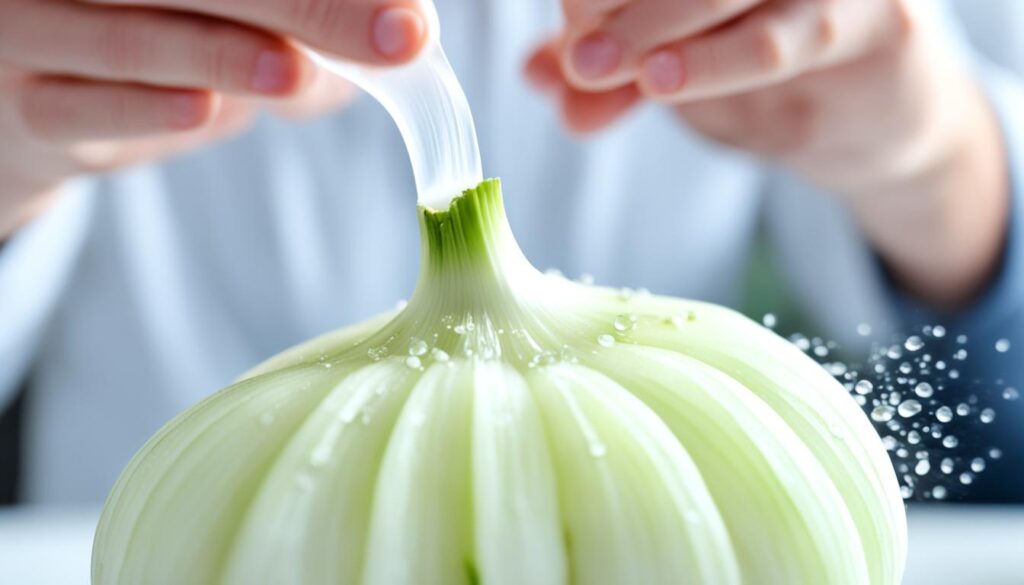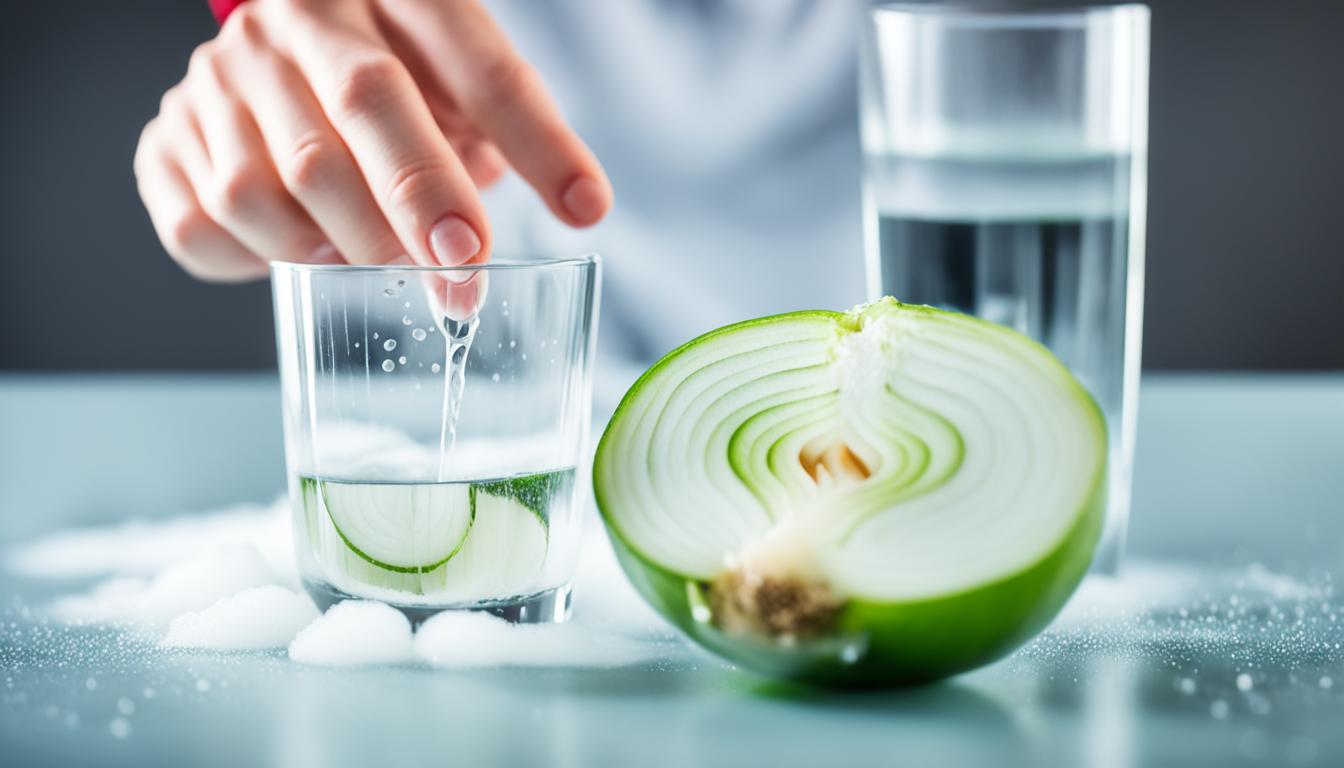Onion has long been recognized for its potential as a natural remedy for cough and cold symptoms. While scientific research on certain methods, such as placing a raw onion in a sock overnight, is limited, there are other ways in which onions can benefit respiratory health. When consumed, onions provide essential nutrients, such as vitamin C, while being low in calories and high in fiber. These nutritional qualities make onions a valuable addition to a healthy diet.
In addition to its nutritional value, onion is believed to have potential medicinal properties. Some studies suggest that certain compounds in onions may possess anti-inflammatory, antioxidant, and antimicrobial effects. These properties may help alleviate cough and cold symptoms by reducing inflammation, boosting the immune system, and fighting off respiratory infections.
While onions alone may not be a cure-all for cough and cold, they can complement other evidence-based remedies. For example, drinking a warm onion tea or combining onion with honey as a soothing cough syrup have been popular natural remedies used for centuries. It’s important to note that these natural remedies should be used in conjunction with, and not as a substitute for, medical advice and treatment.
Key Takeaways:
- Onions are low in calories, high in fiber and nutrients, including vitamin C.
- Onions may have anti-inflammatory, antioxidant, and antimicrobial properties.
- Consuming onions can support respiratory health and potentially alleviate cough and cold symptoms.
- Natural remedies, such as onion tea or onion with honey, can complement evidence-based treatments for cough and cold.
- Consult a healthcare professional for personalized medical advice before trying any home remedy.
The Origins of the Onion in Sock Remedy
The tradition of placing a raw onion in a sock as a remedy for cold and flu symptoms dates back to the 1500s. It originated from the belief that raw onions could purify the air and cleanse the blood. This practice was based on the notion of “noxious air” before the discovery of germs in disease transmission.
“Onion keeps off infection.” – 17th-century proverb
Some modern articles suggest that the odorous sulfuric compounds in onions give them healing properties. These compounds, such as thiosulfinates and sulfides, are responsible for the pungent smell of onions and are released when the onion is cut or crushed. However, there is a lack of scientific evidence to support the effectiveness of the onion in sock remedy.
It is worth noting that reflexology, another practice linked to the onion in sock remedy, also lacks scientific evidence as an effective treatment for illness.
Onion in Folklore and Remedies
The use of onion as a remedy for various ailments, including cold and flu symptoms, can be found in folklore and traditional medicine across different cultures. However, it is important to approach these remedies with caution and consider them as cultural practices rather than evidence-based treatments.
Folklore remedies often embrace the belief that onions possess therapeutic properties due to their strong aroma and potential antibacterial effects. However, scientific research is needed to validate these claims and understand the true healing potential of onions.
| Beliefs and Folklore | Scientific Evidence |
|---|---|
| Raw onions purify the air and cleanse the blood. | Limited scientific evidence. |
| Odorous sulfuric compounds in onions have healing properties. | Lack of scientific evidence for the onion in sock remedy. |
The Lack of Scientific Evidence for Onion in Sock Remedy
Despite claims made by many people about the effectiveness of the onion in sock remedy, there is currently no scientific evidence to support its use in treating cold and flu. The few available studies on the health benefits of onions mention their sulfuric compounds, but they do not specifically investigate the onion in sock remedy. Most articles and claims online are based on anecdotes rather than scientific research. Furthermore, there is limited evidence to support reflexology as an effective treatment for any medical condition. It is important to rely on evidence-based treatments and consult a doctor before trying home remedies.
Scientific evidence for onion in sock remedy:
The claims surrounding the onion in sock remedy have not been backed by scientific evidence. While some articles mention the potential health benefits of onions, studies specifically investigating the onion in sock remedy are lacking. Anecdotal claims and folklore have influenced the popularity of this home remedy, but it is important to consider the lack of scientific research supporting its effectiveness.
The Importance of Evidence-Based Treatments
When it comes to finding effective remedies for cold and flu symptoms, relying on evidence-based treatments is crucial. While natural remedies may have their merits, it is essential to prioritize treatments that have been scientifically proven to work. Consulting a medical professional is advisable before trying any home remedy to ensure safety and effectiveness.
A Lack of Research
One key factor contributing to the lack of scientific evidence for the onion in sock remedy is the absence of research specifically focused on this method. While onions have been studied for their health benefits, the onion in sock remedy remains largely unexplored in the scientific community. This highlights the need for more comprehensive studies to evaluate the efficacy of this traditional practice.
Folklore vs. Research
The onion in sock remedy belongs to a realm of folklore remedies passed down through generations. These remedies often gain popularity based on anecdotal claims and subjective experiences rather than scientific research. While folklore remedies can hold cultural significance, it is essential to critically assess their efficacy based on scientific evidence.
Anecdotal Claims and Popular Beliefs
Anecdotal claims surrounding the onion in sock remedy often stem from personal experiences and testimonies. While these individual accounts may suggest positive outcomes, it is important to recognize the limitations of anecdotal evidence. Without rigorous scientific studies, it is challenging to determine whether the effectiveness of the remedy is a result of the onion itself or other factors such as placebo effects or natural healing processes.
Summary of Scientific Evidence for Onion in Sock Remedy
| Scientific Evidence | Onion in Sock Remedy |
|---|---|
| Studies Investigating the Remedy | Currently lacking |
| Evidence Supporting Effectiveness | Insufficient |
| Credible Research | Not available |
| Anecdotal Claims | Commonly found |
In summary, while the onion in sock remedy may have gained popularity due to anecdotal claims and folklore, scientific evidence supporting its effectiveness is currently lacking. It is important to approach home remedies with caution and prioritize evidence-based treatments that have been scientifically validated.
Other Natural Remedies for Cold and Flu Symptoms
While the onion in sock remedy lacks scientific evidence, there are alternative natural remedies that can help alleviate cold and flu symptoms.
Honey and Lemon for Sore Throat
A popular and soothing remedy for a sore throat is a warm drink made with honey and lemon. Honey has been shown to have antibacterial properties and can help coat the throat, providing relief. Lemon, on the other hand, is rich in vitamin C, which can boost the immune system. To make the drink, mix a tablespoon of honey and the juice of half a lemon in a cup of warm water. Sip on the mixture throughout the day to soothe your sore throat.
Fresh Ginger for Nausea
Nausea is a common symptom of the flu. Fresh ginger has natural anti-inflammatory properties that can help alleviate feelings of nausea. You can make ginger tea by slicing a few pieces of fresh ginger and steeping them in boiling water for about 10 minutes. Strain the ginger and sip on the warm tea. Alternatively, you can add fresh ginger to your meals or chew on a small piece of ginger to help reduce nausea.
Salt Water Gargling for Respiratory Infections
Gargling with salt water can help relieve the symptoms of respiratory infections such as a cold or the flu. The salt water creates an osmotic effect that can help reduce swelling and inflammation in the throat. Dissolve half a teaspoon of salt in a glass of warm water and gargle with the solution for 30 seconds before spitting it out. Repeat the process several times a day to help reduce discomfort and promote healing.
Paracetamol for Fever
If you have a fever accompanying your cold or flu, over-the-counter paracetamol can help reduce your body temperature and alleviate any associated aches and pains. Follow the recommended dosage instructions on the packaging and consult with a healthcare professional if you have any concerns. Remember to stay hydrated and rest while taking paracetamol or any other medication.

These natural remedies have been backed by scientific research and can provide relief for common cold and flu symptoms. Remember that natural remedies may not work for everyone, and it’s always a good idea to consult with a healthcare professional before trying any new remedies, especially if you have underlying medical conditions or are taking other medications.
Debunking Internet-Viral Natural Remedies
While the internet is filled with viral natural remedies for cold and flu, it’s important to evaluate their scientific validity. Many of these remedies gain popularity through social media platforms and online communities, but their effectiveness may not be supported by reliable evidence.
“Drinking onion water is a popular remedy on TikTok, but there is no scientific proof that it alleviates respiratory symptoms caused by colds or the flu,” says Dr. Smith from the Medical Research Institute.
Another widely shared remedy is eating raw garlic to boost the immune system. However, the scientific evidence supporting this claim is insufficient to draw any definitive conclusions.
Essential oils, such as eucalyptus and peppermint, are often touted as immune system boosters. However, there is no scientific research to back up their healing properties or their efficacy in preventing or treating colds and flu.
“While some preliminary studies suggest that elderberry extract may reduce flu symptoms, more research is needed to establish its effectiveness and safety,” explains Dr. Johnson, a renowned immunologist.
When it comes to internet-viral natural remedies, it’s crucial to rely on reputable sources and consult a healthcare professional before trying them. They may appear appealing due to their popularity, but without scientific evidence, their efficacy remains uncertain. Always prioritize evidence-based treatments and consult with a healthcare professional for personalized advice.

| Remedy | Scientific Evidence |
|---|---|
| Onion Water | No scientific proof of effectiveness |
| Raw Garlic | Insufficient evidence to support immune-boosting claims |
| Essential Oils | No scientific research supporting immune-boosting properties |
| Elderberry Extract | Preliminary studies show potential, but more research needed |
Traditional Dominican Natural Remedies
Traditional remedies passed down through generations can offer alternative natural remedies for cold and flu symptoms. In Dominican culture, ingredients like onions, apples, limes, ginger, and turmeric are used to combat illnesses. Steffy, a Dominican native, shares her family’s remedies.
The Dominican cold care tea is a popular remedy that includes a combination of ingredients known for their health benefits. Here is a recipe for the tea:
- 1 apple
- 1 lime
- 1 small red onion
- 1-inch piece of ginger
- 1 cinnamon stick
- 1 teaspoon turmeric
- Honey to taste
To prepare the tea, follow these steps:
- Peel and chop the apple.
- Squeeze the juice of the lime.
- Peel and chop the red onion.
- Grate the ginger.
- Boil 4 cups of water in a saucepan.
- Add the chopped apple, lime juice, red onion, grated ginger, cinnamon stick, and turmeric to the boiling water.
- Simmer for 10-15 minutes.
- Remove from heat and strain the tea.
- Add honey to taste and stir well.
- Enjoy the warm tea for relief from cold and flu symptoms.
In addition to the cold care tea, Steffy’s family remedies for coughs involve a blend of ingredients known for their soothing properties.
Here is a recipe for the cough remedy:
- 1 small red onion
- 2 cloves of garlic
- 1-inch piece of ginger
- 1 teaspoon turmeric
- Honey to taste
- Freshly squeezed lime juice
To prepare the cough remedy, follow these steps:
- Peel and chop the red onion.
- Mince the garlic cloves.
- Grate the ginger.
- In a bowl, combine the red onion, minced garlic, grated ginger, turmeric, honey, and freshly squeezed lime juice.
- Mix well until all the ingredients are evenly combined.
- Consume a spoonful of the mixture whenever you have a cough.
These traditional Dominican remedies are rooted in the belief that certain ingredients can help break down congestion, draw out toxins, and soothe symptoms. However, it’s important to note that these remedies are cultural practices and should be used with caution. It’s always advisable to consult with a healthcare professional before trying any new remedies.
Consult with a healthcare professional before trying any new remedies.
Conclusion
While onion has been a popular natural remedy for cough and cold, it’s important to note that the onion in sock remedy lacks scientific evidence to support its effectiveness. When seeking relief from cold and flu symptoms, it is crucial to rely on evidence-based remedies and consult with a healthcare professional.
Several evidence-based natural remedies have shown efficacy in relieving symptoms. Drinking tea with honey and lemon can soothe a sore throat, while consuming hot water with fresh ginger can help alleviate feelings of nausea. Gargling with salt water may help prevent upper respiratory tract infections, and over-the-counter medication like paracetamol can reduce fever and relieve aches and pains.
When exploring natural remedies, it’s important to approach internet-viral remedies with caution. It’s advisable to seek advice from reputable sources to ensure safe and effective treatment. Consulting with a healthcare professional can provide guidance on suitable remedies based on individual circumstances and any potential interactions with other medications or treatments.
Overall, while onion has its merits, it’s best to rely on evidence-based remedies and consult with a healthcare professional for the treatment of cough and cold symptoms. By doing so, individuals can make informed decisions and ensure their health and well-being.


